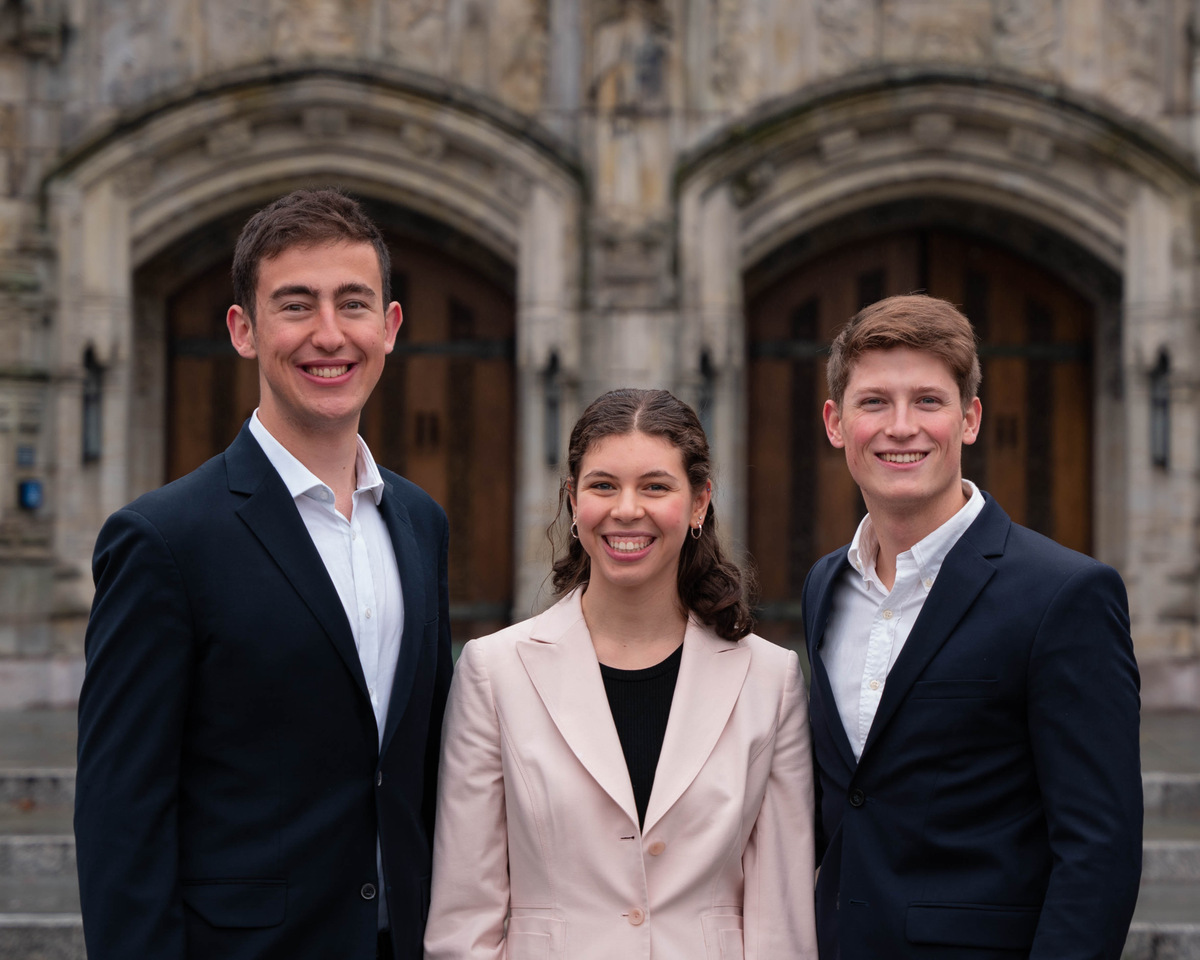Yale undergraduates develop award-winning strategy to prevent gun violence
Yale students place first for their proposal for reducing gun violence in communities at the Tulane Health Policy Case Competition

Courtesy of Sam Rifkind-Brown
Three Yale undergraduates developed a multi-pronged approach to address the gun violence epidemic in the United States through various community resources and entity synergies, winning the Tulane Health Policy Case Competition and highlighting the potential for combining a youth mentorship program and firearm safety training to mitigate gun violence.
Abe Baker-Butler ’25, Patryk Dabek ’25 and Allie Dettelbach ’25 had the winning plan for reducing firearm homicides among the 41 teams from 22 universities that participated in the THPPC. After analyzing the status quo of gun violence in Opelousas, Louisiana, they created a plan — called Operation Healthy Homefront, or OHH — that integrated an after-school mentoring program and firearms safety instruction led by veterans in these communities.
“Gun violence is such a pressing issue, and it is so under-addressed,” Baker-Butler said. “There are so many common sense solutions attracting broad-based support. We’re happy knowing that we’ve been able to make at least some addition to the policy discussion around gun safety with our proposal, but we’re not done yet.”
The idea focuses on involving at-risk youth and veterans in the strategic development of a viable solution for communities with a high incidence of deaths or injuries from a firearm, while also serving as a mutually beneficial program aimed at providing essential skills and opportunities to youth and employment opportunities for veterans.
Baker-Butler described how his earlier experience with public health work tackling substance abuse in his high school and trying to provide accessible healthcare to low-income senior citizens inspired him to compete in this event. All team members combined their interests in policy-making, public health and healthcare to produce a novel solution to a pervasive problem in the United States.
The strong collaboration between the three teammates in this competition allowed them to capitalize on each other’s skills and use the competition to gain new knowledge and create something of long-lasting impact.
Dettelbach noted how the team “wanted to think about how [they] could address that problem from a public health angle but also an angle of political feasibility.” This case competition allowed participants to analyze the multiple levels of government to devise solutions that would withstand the political obstacles to reducing gun violence in the United States.
She argued that numerous stakeholders must collaborate to commit enough resources and efforts toward reasonable, effective and sustainable attempts to mitigate the issues diverse populations face.
“We all learned about the policy-making bodies at each of those levels and the organizations that exist at those levels that we can harness to come to this final proposal,” said Dettelbach.
Dabek, along with Baker-Butler, initially brought up the idea to enter this competition with Dettelbach after hearing about it from Howard Forman, Professor of Diagnostic Radiology, Economics, and Public Health. Dabek spent his summer delivering healthcare as an EMT and establishing a non-profit to improve health conditions in war-ravaged Ukraine. In light of his summer experiences, he evaluated the public health issues plaguing the United States and accepted the opportunity to participate in this competition.
To comprehend how to advocate for social justice and health equity effectively, Dabek emphasized the importance of policy formation in implementing health equity in diverse communities.
Beyond policy proposal and implementation, all team members highlighted the need to collaborate closely with those communities they look to serve with this plan. Dabek said this proposal was only one step in developing the much-needed solution to gun violence.
“We don’t forget about the people that we’re actually serving and the issues they’re dealing with, and we want to ensure we are in contact with the community and see what the community has to say,” said Dabek.
Baker-Butler recognized that the team is grateful to have won and received recognition from the judges. Still, he said, the solution to the gun violence epidemic requires numerous people to continue thinking and coming up with potential ideas to solve this problem.
Forman encouraged his students in his Health Economics and Policy course to participate in this competition because the THPCC “was perfectly aligned with the mission of the class” which aims to “prepare students to critically think about actual challenges in society.”
In many cases, Forman stated, individuals might propose policy solutions and ideas that are “juvenile and naive” and make various suggestions and solutions that are not feasible in implementation.
Forman highlighted the thoughtful and detailed nature of this team’s proposal.
“Every measure [for judging] that I’d look at … either passed or far exceeded my expectations,” said Forman. “My expectation for a proposal of this type is to see something that agrees with the law; It’s not basically imagining a world where certain laws don’t exist … It’s not going to demand such enormous resources to be out of the scope of the problem.”
Forman expressed his desire to witness this proposal be piloted on a small scale, improved and then scaled further to accommodate and assist vulnerable populations. In many ways, these are how programs are kick-started and implemented nationally.
Forman believes that the students’ passion for this issue, coupled with the ability to gain enough attention and support, could be the catalyst for this proposal to be implemented effectively.
The presentation the winners presented to judges can be viewed at this link.
Correction, Dec. 4: The story was updated to reflect the correct spelling of an individual’s last name in the article.







